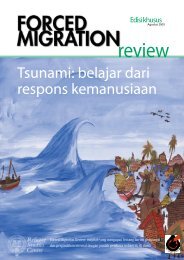FMR 42 full issue pdf - Forced Migration Review
FMR 42 full issue pdf - Forced Migration Review
FMR 42 full issue pdf - Forced Migration Review
Create successful ePaper yourself
Turn your PDF publications into a flip-book with our unique Google optimized e-Paper software.
<strong>FMR</strong> <strong>42</strong><br />
Sexual orientation and gender identity and the protection of forced migrants 29<br />
Barriers to justice in the UK<br />
Charlotte Mathysse<br />
In recent years, there have been significant legal<br />
advances in the treatment of the cases of lesbian<br />
and gay asylum seekers in the UK. However, various<br />
barriers still remain.<br />
Interviews with case workers, solicitors specialising<br />
in LGBT asylum cases and a gay immigration charity<br />
in the UK indicate that UKBA officials resort to<br />
obsolete stereotypes in order to ‘inform’ their decision<br />
making. Asylum seekers have been denied protection<br />
because they have appeared too typically straight<br />
and often applicants are expected to act, dress<br />
and speak in certain ways which conform to rigid<br />
Western notions of sexuality. Lesbians have been<br />
rejected for not seeming butch enough, and gay men<br />
have been asked if they frequented parks for sex.<br />
These deeply held assumptions about how lesbian<br />
and gay identity ought to be manifested undermine<br />
any effective and protective asylum system.<br />
Many asylum seekers have also found that the<br />
presence of interpreters can sometimes be<br />
detrimental to their application. Claimants in the<br />
asylum process are allowed to choose the gender<br />
of their interpreter, and that interpreter should be<br />
aware of cultural or religious sensitivities. However,<br />
interpreters in the UK receive no training on LGBT<br />
<strong>issue</strong>s and there are no imminent plans to address<br />
this. Many LGBT asylum seekers fear being interpreted<br />
by someone from their home community. In many<br />
refugee communities in the UK, homophobia is<br />
as common as it is back in the home country, and<br />
often interpreters are a representation of this. There<br />
have been instances where interpreters have used<br />
abusive language against applicants, or mistranslated<br />
their statements. Accurate interpreting is essential<br />
because often a decision is based upon the<br />
precision and coherence of the witness statement.<br />
If there are inconsistencies or mistranslations,<br />
then a whole claim may be jeopardised.<br />
Government cuts to legal aid have also<br />
disproportionately affected lesbian and gay asylum<br />
seekers. Legal aid law firms now have less time to<br />
construct a coherent case to present to the Home<br />
Office, meaning that some asylum seekers face<br />
their UKBA interviews without sufficient preparation.<br />
Lesbian and gay asylum applications often take<br />
longer because the applicant must have ‘come<br />
out’ to the solicitor, and be prepared to talk openly<br />
about their sexuality in front of a UKBA official.<br />
Clear guidance exists on how to approach sexuality<br />
claims but is being ignored. Decision makers are<br />
instead resorting to ignorance and heterosexist<br />
biases in judging cases. This has resulted in the<br />
identity of the decision-maker, rather than that of the<br />
applicant, becoming the decisive factor in a claim.<br />
Charlotte Mathysse c.mathysse@gmail.com has<br />
recently completed a Masters in <strong>Migration</strong> Studies<br />
at the University of Sussex and is now working for<br />
the Kenya Red Cross in Nakuru and for a gender<br />
equality training programme.<br />
Resources for those representing asylum claims on grounds of sexual orientation<br />
The Fahamu Refugee Programme’s information<br />
portal for those providing legal aid to refugees<br />
is expanding its resources for those defending<br />
cases based on sexual orientation – lesbian, gay,<br />
bisexual, transgender and intersex (LGBTI).<br />
To facilitate instant access to the information that<br />
lawyers need when preparing an asylum case for<br />
adjudication, the Fahamu Refugee Programme is<br />
aiming to provide Country of Origin Information for all<br />
192 UN member states. To date, 30 are available; the<br />
rest should be available by the end of 2013.<br />
http://tinyurl.com/Fahamu-SOGI-country-list<br />
For each country this resource will provide<br />
specific legislation and case law (where it can be<br />
found), plus a section on public attitudes and/<br />
or the state’s capacity to protect LGBTI persons.<br />
Each country page will conclude with a list of<br />
relevant NGOs (where they exist) and countryof-origin<br />
specialists who have agreed to provide<br />
statements on the plausibility of individual cases.<br />
For more information, or to offer relevant<br />
information, please contact Eddie Bruce-Jones<br />
eddiebrucejones@gmail.com<br />
www.refugeelegalaidinformation.org




